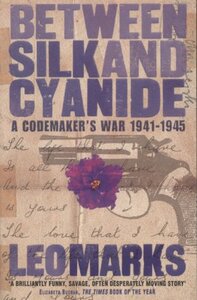Take a photo of a barcode or cover
reflective
medium-paced
If you've ever wanted to know the nitty gritty of spy coding in WWII, this is the book for you. An ex coder tells us as much as he can given classifications, and even just what he's able to relate is something that will keep you intrigued.
informative
tense
medium-paced
Like many nonfiction war novels, this book is heartbreaking. Somehow all these years later, armies still have bureaucracy issues and people won’t “play nice” when we’re on the same side - and this novel highlights the very real consequences of that in war with agents’ lives lost.
The author’s self-assuredness comes through and reads as cockiness sometimes, but it lent a very authentic feel to the story, even if I doubt his memory’s accuracy on some things all these years later (especially after reading The Optimism Bias, lol).
Highly recommend for anyone who’s into nonfiction war stories or WWII stuff! You don’t have to be able to fully understand the codes he introduces to be able to follow the book.
The author’s self-assuredness comes through and reads as cockiness sometimes, but it lent a very authentic feel to the story, even if I doubt his memory’s accuracy on some things all these years later (especially after reading The Optimism Bias, lol).
Highly recommend for anyone who’s into nonfiction war stories or WWII stuff! You don’t have to be able to fully understand the codes he introduces to be able to follow the book.
adventurous
challenging
dark
funny
informative
sad
tense
medium-paced
An incredible story. Marks recalls his efforts as a code-breaker for SOE with a balance of mirth and misery. He's dismissive of his own accomplishments (the code he engineered, for example, was being used well into the Cold War), while he readily sings the praises of the agents who parachuted into occupied countries. Further, he illuminates some of the bureaucratic and logistical hurdles the allies needed to overcome in order to beat the German's coders, signal-finders, and deciphering agents.
A note: This story does not examine the more famous Enigma code (during the war this work was done at Bletchley Park, which did not often coordinate with SOE). However, the work done by Leo Marks is equally extraordinary, and well-worth the read, especially for those interested in wartime coding.
A note: This story does not examine the more famous Enigma code (during the war this work was done at Bletchley Park, which did not often coordinate with SOE). However, the work done by Leo Marks is equally extraordinary, and well-worth the read, especially for those interested in wartime coding.
Leo Marks worked in SOE during the Second World War, and this book is an account of what happened to him during that time. Marks writes with great humor (his father owned 84 Charing Cross Road), and sympathy. He is also respectful of the women he works with - doesn't look down on them acknowledges their intelligence. One of the funniest sections of the book has to do with monthies.
I just wish there had been years at the top of each chapter.
I just wish there had been years at the top of each chapter.
I listened to the audio version of this book. Because my mother was a decoding agent for MI5 during the war, and my father dropped into occupied France with the Jedburghs, a division of OSS, this book had special meaning for me. Mr. Marks could well have trained my father on how to send coded messages back from France. So I was particularly fascinated by all the thinking that went into the training of the secret agents. I was also heartened to learn of the deep concern that Marks and other members of the SOE held for those agents, many of whom were tortured and killed by the Germans. The book is very tongue-in-cheek perhaps because the author was only in his early 20s when he went through World War II in this clandestine occupation. He was self-conscious about being Jewish and about still living with his parents. His mother made sandwiches for him to take to work every day. It’s an intriguing and totally honest story from what I can tell.
This is the story of a man who came from a family of booksellers, who cracked his first code at age 8, and ended up working for one of several British intelligence/counterintelligence organizations during WWII. It is both a look into the very real, James-Bond-esque (the author of those novels worked for a "rival" intel org) world of spies and assassination, as well as the fumbling bureaucracy of a national government. How do things like spy rings operate when you have to fill out forms in triplicate?
If that sounds boring, it's not. This is all real-world stuff. You will see how poor decisions back home led to the death of agents (to include being sent to concentration camps), as well as how agents were willingly sacrificed as the result of *good* decisions. There are also several tales in the book of agents who knew they were going to give their lives, entire teams, for objectives as seemingly unimportant as a power plant or storage facility.
This last, to me, conveyed the seriousness of the Nazi/Axis threat, when men and women (and there were a LOT of female intelligence operatives, I'd say the numbers were about even in this story) were willing to sacrifice themselves and their friends for something as "trivial" to us modern readers as a railway station or shipment of ammunition.
Mr. Marks was also a code creator, and was responsible in large part (as far as creating the code goes, not for logistics) for the silk code sheets that Allied forces carried for radio communications during the invasion of Normandy. You can actually see a representation of this in the film Saving Private Ryan. Those would be Mr. Marks' silks.
In addition to his own story, Marks recounts going to a "lab" of sort where gadgets that you think only existed in James Bond really came to be (again, the author of those books simply lifted ideas for what was actually used). They took various animal dung, real, and made fiberglass molds out of it for intelligence drops. Codes were sewn into clothing. Radios were hidden in literally everything that could fit them. Tailors from occupied countries were put to work forging their own clothes, so that they would fit in, labels were smuggled out (just labels!) to make the clothing authentic...ever see a current-day German tourist in America? They're allllllmost fitting in, but something is a bit different. Those tiny "hmms" would set off the local Axis counter-intel rings and local law enforcement. Maybe the cut of the shirt is a bit different, or the placement of the back pocket on the jeans is off.
Anyway, very interesting read, and long. There is a lot of loss in this book (Mr. Marks works with people whose average life expectancy was 6 weeks once put in the field), and it is presented very matter-of-fact. Very enjoyable.
If that sounds boring, it's not. This is all real-world stuff. You will see how poor decisions back home led to the death of agents (to include being sent to concentration camps), as well as how agents were willingly sacrificed as the result of *good* decisions. There are also several tales in the book of agents who knew they were going to give their lives, entire teams, for objectives as seemingly unimportant as a power plant or storage facility.
This last, to me, conveyed the seriousness of the Nazi/Axis threat, when men and women (and there were a LOT of female intelligence operatives, I'd say the numbers were about even in this story) were willing to sacrifice themselves and their friends for something as "trivial" to us modern readers as a railway station or shipment of ammunition.
Mr. Marks was also a code creator, and was responsible in large part (as far as creating the code goes, not for logistics) for the silk code sheets that Allied forces carried for radio communications during the invasion of Normandy. You can actually see a representation of this in the film Saving Private Ryan. Those would be Mr. Marks' silks.
In addition to his own story, Marks recounts going to a "lab" of sort where gadgets that you think only existed in James Bond really came to be (again, the author of those books simply lifted ideas for what was actually used). They took various animal dung, real, and made fiberglass molds out of it for intelligence drops. Codes were sewn into clothing. Radios were hidden in literally everything that could fit them. Tailors from occupied countries were put to work forging their own clothes, so that they would fit in, labels were smuggled out (just labels!) to make the clothing authentic...ever see a current-day German tourist in America? They're allllllmost fitting in, but something is a bit different. Those tiny "hmms" would set off the local Axis counter-intel rings and local law enforcement. Maybe the cut of the shirt is a bit different, or the placement of the back pocket on the jeans is off.
Anyway, very interesting read, and long. There is a lot of loss in this book (Mr. Marks works with people whose average life expectancy was 6 weeks once put in the field), and it is presented very matter-of-fact. Very enjoyable.
Interesting account of the cryptographer's challenges during WW2. The author's style is engaging. Worth reading if you are interested in that sort of thing.
challenging
informative
inspiring
mysterious
reflective
slow-paced




